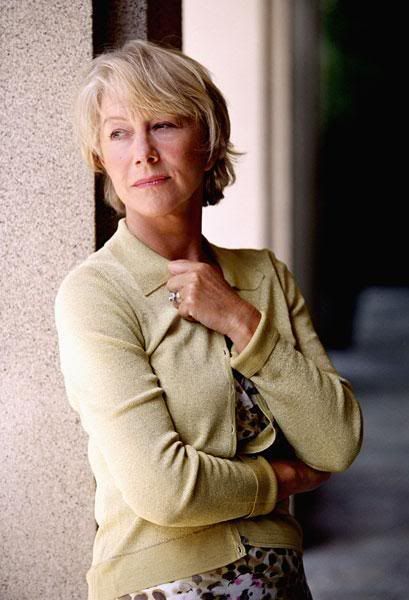Appearing at The Jaundiced Eye, the Independent Bloggers' Alliance, and My Left Wing.
It seems the Brits are in a tiz over outrageous comments by Helen Mirren about rape trials.
Dame Helen Mirren was accused by the Solicitor General of making ignorant, absurd and dangerous comments yesterday after speaking out again about rape prosecutions. In an interview, the 63-year-old Oscar-winning actress said that in such cases female jurors are deliberately selected by defence barristers because 'women go against women'.
She suggested that women jurors are less likely to convict a rapist since they tend to think the victim was 'asking for it'.
Well, how dare she suggest that sisterhood would not reign in a rape trial?
Trouble is she's absolutely right.
I would not claim to know how juries are selected in Great Britain, and it may well be totally random, as Solicitor General Vera Baird claims. But, here in the US, where attorneys are very involved in jury selection, it's an absolute fact that your better rape prosecutors try to stack juries with men.
I was somewhat stunned to learn this some years ago, while reading up on the "preppy murder trial." Robert Chambers, who was convicted for the murder of Jennifer Levin, was prosecuted by renowned attorney Linda Fairstein. Fairstein, who specializes is rape prosecutions said, when interviewed, that she would always try to tilt juries in the male direction, because women jurors are less likely to convict rapists. Her statement struck me as so counter-intuitive that it always stuck with me. I did a bit of googling, to check my own memory, and Fairstein is not alone in this assessment.
However, female jurors frequently do not side with the female complainant. Indeed, according to a Newsday article, “The most sympathetic juror a rape victim can hope for… is not a well-dressed, educated working woman, but a stocky, conservative, middle-aged Italian man. The Italian man, the researchers reason, regards women as fragile and in need of defense and will usually side with the accuser” (Tyre, 1991, p. 10). The article also quotes Barbara Eganhauser, a lead sex crimes prosecutor in Westchester County, who believes “women, even young women with contemporary lifestyles and values, often reject another woman’s accusation or rape and sex abuse out of their own fear” (Tyre, 1991, p. 10).
Several other authors also note that female jurors often do not accept as true the testimony of complainants. Attorney Julie Wright (1995) argues that these jurors distrust the complainants because they do not want to believe that something horrible could happen to “good people”. Such women subscribe to the “just world hypothesis,” that bad things do not happen at random, but rather everything in the world occurs for a reason. According to this theory, misfortune strikes only those worthy of hardship (Wright, 1995). Wright cites Elaine Walster’s research study, in which undergraduates were told of increasingly horrible things that happened to another person. The worse the event, the more likely the subject assigned blame to the other person, as it was “reassuring if the person [could] somehow blame the victim, taking the loss out of the realm of the uncontrollable” (Wright, 1995, p. 20). Using this logic, female jurors do not wish to imagine that rape could happen to them, and therefore the more they identify with the complainant, and the more hideous the crime, the more they need to deny the complainant’s claim. Wright notes that “Linda Fairstein, Chief of the Manhattan District Attorney’s Sex Crimes Unit, has observed that ‘for many women, the need to shield themselves from their own vulnerability to sexual assault is paramount. If they can insist that the victim engaged in behavior that they would never engage in, such as visiting a bar or going to a man’s apartment, they can convince themselves they are not at risk’” (Wright, 1995, p. 22). Thus, it is so frightening for the female juror to identify with the complainant that she needs to deny the complainant’s testimony, in order for the juror to feel safe in the world.
Furthermore, Gloria Cowan (2000) contends that women often disbelieve other women’s tales of sexual violence out of their own internalized oppression. She writes that many women are hostile to their own sex, and internalize negative female stereotypes. These women are more likely to “blame the victim” in the case of rape or sexual harassment. Cowan’s research study, using questionnaire responses from 155 college women, found a correlation between women’s hostility towards other women and women’s toleration of men mistreating women. While Cowan’s article does not specifically apply to jurors in rape cases, it does provide a persuasive argument as to why females may be disinclined to believe the victim of sexual abuse.
Sad, but true. |









0 comments:
Post a Comment